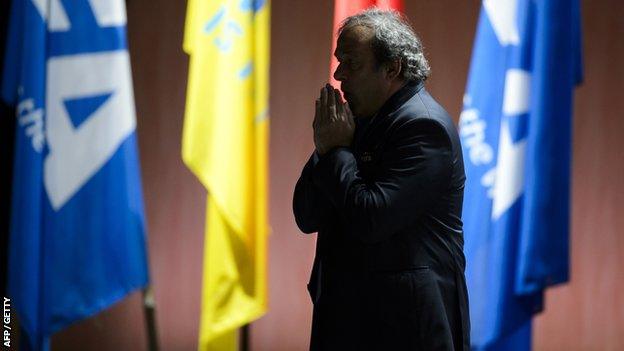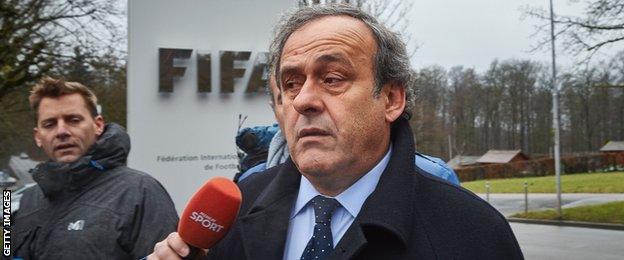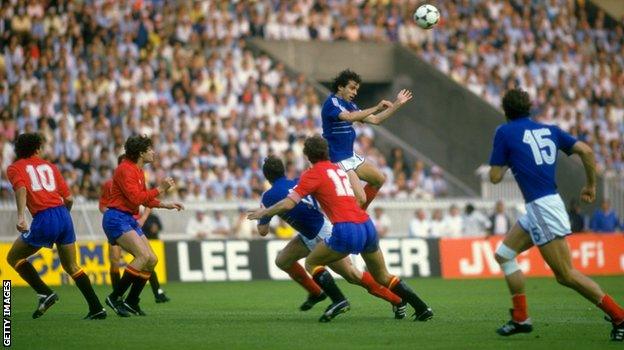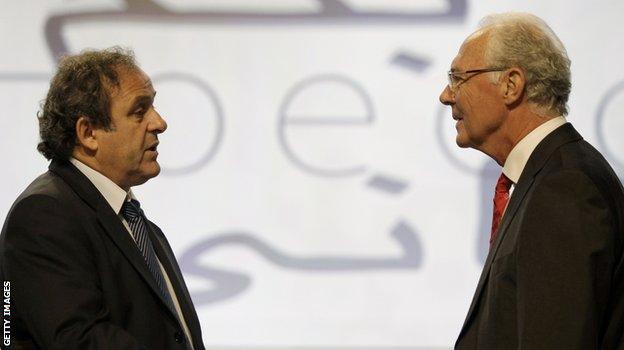Michel Platini: The downfall of man who would have been Fifa king
- Published

Uefa president Michel Platini will resign from European football's governing body after failing to have a six-year ban from football overturned
Just imagine for a moment that, next month, hosts France win the European Championship.
And that their star midfielder scores a remarkable nine goals in the tournament, including two hat-tricks, as well as scoring in the final.
And that he is the team's captain.
And that this season, he has already won the league championship in Italy with Juventus, as well as a European title for his club, along with the Ballon d'Or.
Which he won last year. And which he will win again next season. Along with the European Cup.
That is what Michel Platini achieved in 1984, when, in his pomp, he inspired his country to their first ever major tournament title.
Consider all this for a moment, how sensational that would be, and it is easy to understand why, among the increasingly crowded ranks of the Fifa rogue's gallery, it is his downfall that saddens the hearts of many football lovers the most.
Unlike former President Sepp Blatter, or the other career politicians and bureaucrats that made up most of the governing body's other pantomime villains; (Jack Warner, Chuck Blazer, Jeffrey Webb and Jerome Valcke, to name just a few), Platini graced the game he loved.
Most fans over the age of 40 will associate the playmaker - nicknamed 'Le Roi' - with his captivating performances for club and country during his mid-1980s peak, when he was widely regarded as the best player on the planet.
Sadly, for those who never saw Platini's sublime skills on the pitch, or were too young to truly appreciate them, the end of his nine-year reign as Uefa president means he will now become just another symbol of Fifa's fall into disrepute.
For others, however, the end of his political career is to be mourned.
Speaking from Mexico City where Fifa is preparing to hold its annual congress later this week, Fifa's British vice president David Gill told me that Platini's resignation, after he lost his fight to clear his name for breaching Fifa ethics rules at the Court of Arbitration for Sport (Cas), was "a loss to the game".

It seemed a matter of time until Platini would become Fifa president
"He brought the clubs and Uefa together," he said. "He was an innovator. He had knowledge, ideas and personality. He surrounded himself with exceptional people at Uefa and had great relationships with the coaches. He was a man of humour and has a sense of fun. He was an excellent Uefa president, in my opinion."
How quickly things can change. Eighteen months ago I interviewed Platini at St George's Park as he toured the training facilities.
To see him that November day, with Football Association staff hanging on his every word and whim, to observe FA chairman Greg Dyke so thrilled to play host, was to see Platini at the height of his powers as a politician.
Platini even felt confident enough to tell me, with typical disregard for the doubters, that he had "no regrets" about his controversial decision to vote for Qatar to host the 2022 World Cup, despite the allegations of corruption and human rights abuses directed against the country, and the havoc a winter tournament would play with the calendars of the European leagues and clubs he was meant to represent.
Taking football's showpiece event to the Arab world for the first time was, he insisted, an honourable choice. And his FA hosts, despite having previously cursed the Qatar vote and its ramifications, simply smiled and nodded.
It seemed a matter of time until Platini would become Fifa president.

Platini (centre) played an integral role as France won their first major championship in 1984
Who better, the FA asked themselves, than a man who, having excelled as player and coach, showed his administrative clout by organising the 1998 World Cup in France? Who better than a man who had reigned over European football and its 54 different national associations since 2007, when he had surprisingly beat the incumbent Lennart Johansson?
With the exception of his stubborn opposition to goal-line technology, Platini had established himself as an innovator.
He challenged the status quo, meddling with the qualification process for the European Championships to increase it to 24 teams, and proposing a pan-European format for the 2020 tournament.
He gained credit for backing proposals designed to increase the number of home-grown players, for increasing diversity in the Champions League by making it easier for clubs from smaller countries to qualify, and at least appeared to be trying to curb over-spending through his controversial Financial Fair Play (FFP) reforms, although they were eventually watered down amid significant criticism.
Who better than a man who, at the time we met at St George's Park that day, was busy distancing himself from the tainted Blatter reign, demanding that his old friend honour his pledge to walk away after a fourth term as president. He was the obvious heir apparent, and the FA, like many others, intended to cling tightly to the Frenchman's coat-tails.
That November day in 2014, Platini was still considering whether he should stand against Blatter the following year.
A few weeks later, having accepted football's long-serving overlord remained unbeatable, Platini decided instead to back the sole challenger, Prince Ali.

Platini voted for Qatar to host the 2022 World Cup having initially suggested he would vote for the US
Then, last summer, came Fifa's implosion. The dawn raids in Zurich on the eve of the congress. The defiant re-election of Blatter, before his dramatic decision to step down a few days later amid the corruption investigations.
Sensing his chance, and with Blatter out of the way, Platini declared he would stand in 2016, and again, seemed the obvious choice, the overwhelming favourite. The FA rushed to back him, even before he had issued a manifesto.
But then, finally, it all caught up with him. A Swiss criminal investigation into what prosecutors called a "disloyal payment" that he had received from Blatter in 2011 for advisory services a decade earlier, dragged him into Fifa's turmoil.
Described as "between a witness and a suspect" by the Swiss attorney general, he was suspended by Fifa, then banned. It was a scandal from which he never managed to escape.
Perhaps it should have come as no surprise.
The seeds of Platini's downfall had been sown years earlier. Having helped Blatter get elected in 1998, the Frenchman was intrinsically linked to Fifa's old guard. He advised his mentor up until 2002, the reason, according to them both, for that fateful £1.3m payment he subsequently received in 2011, and which ultimately led to his demise.
The fact the payment was made just four months before Blatter was due to face rival Mohamed Bin Hammam in the presidential election, and that Platini backed Blatter, did him no favours.

Platini was last year found guilty of ethics breaches, while Beckenbauer is currently under investigation amid vote-buying allegations
Platini had been a member of Fifa's corruption-plagued executive committee since 2002, and his vote for Qatar (especially after initially suggesting he would vote for the US) left many uneasy, especially amid suggestions he had been leaned on by French president Nicolas Sarkozy, and the fact that his son Laurent headed up a Qatar-owned sports kit company.
Platini denied that either had anything to do with his decision, but it did not look good at a time when trust in Fifa was approaching an all-time low. His refusal to hand back a $25,000 watch given to him by the Brazilian football confederation only reinforced the view that Platini simply did not 'get it', and might be part of the problem, rather than the solution to it.
"He was just too close to the set-up," says Dr David Webber, a specialist in the cultural political economy of football at the University of Warwick.
"For years Platini seemed to transcend the murky politics of Fifa, and was seen as the successor-in-waiting, as if his arrival would make all their problems disappear. But he was never really the man to take Fifa forward.
"We need to think long and hard about the way the game is run, otherwise we're going to see other great players be put off standing for election. We say 'we want someone in power who has played the game'. Well, Platini was that guy. If not him then who? But are others now going to want to get involved?"
As Gianni Infantino, Platini's former number two at Uefa and the man who eventually did replace Blatter, presides over the first meeting of the new Fifa council - and its full congress later this week - he may reflect on the demise of his old friend, and the lessons he can learn.
With criminal investigations in the US and Switzerland continuing, and Fifa's 'victim status' in the eyes of the US Department of Justice thought to be dependent on a crucial package of reforms being implemented, Infantino knows the organisation he now leads - along with its regional confederations - must now prove it has moved on from the era dominated by Blatter and Platini - or its very existence could be on the line.
The fact that Infantino has expressed his "sadness" at Platini's ban being upheld, and swerved a question from the Associated Press agency over whether he would now look to reclaim the £1.3m that Platini received, shows how difficult the so-called 'new Fifa' finds it to truly break from the past.
Platini will always have his playing career. No one can take away from him those days when, as the key member of the France midfield's 'carre magique' (magic square), he inspired his country to European Championship glory in 1984 with that incredible record tally of nine goals in five matches.
But 32 years on, as France prepares to host the tournament again, his mistakes - and his sheer inability to accept them as such - mean that rather than presiding over the action in an official role as he had so wished, he will be reduced to that of mere spectator.
Platini can continue to deny any wronging. He can appeal against the decision by Cas through the Swiss courts and rage against what he says is a "deep injustice". He fought and battled as a player. He does so again now. He knows no other way.
Maybe the system dictated that Platini had to behave the way he did to have any chance of replacing Blatter one day. And perhaps Blatter ensured that such a succession would never happen once Platini turned against him. But ultimately it does not matter.
The parallels with Franz Beckenbauer - currently under investigation amid vote-buying allegations surrounding Germany's bid for the 2006 World Cup - another footballing great-turned-statesman of the game, are obvious.
At a time when football is crying out for more former stars to play a role in the future governance of the game, these two fallen idols serve as an especially painful lesson.
Have you added the new Top Story alerts in the BBC Sport app? Simply head to the menu in the app - and don't forget you can also add score alerts your football team and more.
- Published20 June 2016

- Published7 June 2019

- Published2 November 2018
